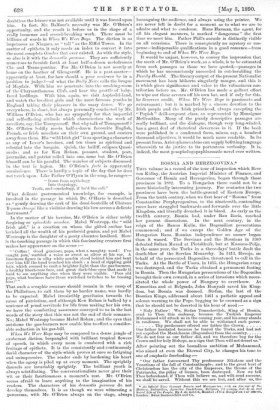MR. O'BRIEN'S NOVEL.*
THAT Mr. William O'Brien should have written a novel is not so much a source of surprise to us as that he should never have done so before. But politics are a busy calling, and • When We Were Bop: a Novel. By William O'Brien, M.P. London : Longmans, Green, and Co.
doubtless the leisure was not available until it was forced upon him. In fact, Mr. Balfour's necessity was Mr. O'Brien's opportunity, and the result is before us in the shape of a really immense and record-breaking work. There must be billions of words in When We Were Boys. The diction is as impetuous as Niagara, as " tall" as the Eiffel Tower. In the matter of epithets, it only needs an index to convert it into
the most complete Gradus that ever existed. As with the style, so also is it with the dramatis persona,. They are sufficiently
numerous to furnish forth at least half-a-dozen melodramas Cis- and Trans-pontine. For Mr. O'Brien is not merely at home on the heather of Glengaxriff. He is a past-master- apparently at least, for how should a poor reviewer be in a position to judge ?—of what the Daily News calls the brogue of Mayfair. With him we penetrate into the smoking-room of the Chrysanthemum Club, and hear the prattle of baby- faced lordlings. With him, again, we visit Asphodel-land, and watch the loveliest girls and the most fatuous youths in England taking their pleasure in the mazy dance. • We go everywhere, in short, but always personally conducted by Mr.
William O'Brien, who has no sympathy for that impartial and self-effacing attitude which characterises the work of novelists, say, like Tourgueneff. But why talk of Tourgueneff ? Mr. O'Brien boldly meets half-a-dozen favourite English, French, or Irish novelists on their own ground, and canters away from them. His "wild Irish girl " is as sporting a character as any of Lever's heroines, and ten times as spiritual and celestial into the bargain. Quish, the bailiff, eclipses Quasi- modo : and as for Ken Rohan, peasant, student, poet, journalist, and patriot rolled into one, none but Mr. O'Brien himself can be his parallel. The number of subjects discussed in the text is legion. Mr. O'Brien's forte is apparently omniscience. There is hardly a topic of the day that he does not touch upon. Like Father O'Flynn in the song, he ranges-
" Down from mythology Into thayology,
Troth, and conchology, if he'd the call."
What delicate gastronomical knowledge, for example, is involved in the passage in which Dr. O'Harte is described as " gently drawing the cork of his demi-bouteille of Chateau Yquem gtampe like a violinist drawing his bow across a delicate instrument."
In the matter of his heroine, Mr. O'Brien is either nobly forgiving or splendide mender. Mabel Westropp, the " wild Irish girl," is a creation on whom the gifted author has lavished all the wealth of his perfervid genius, and yet Mabel Westropp is the daughter of a gouty absentee landlord. Here is the touching passage in which this fascinating creature first -makes her appearance on the scene :-
"Coffins! Good gracious, papa, what a naughty word ! I've -caught you,' warbled a voice as sweet as silver at his ear. A luminous figure in silky white muslin stood behind him and bent over him till the head touched his cheek : a head of rippling gold hair, which seemed to emit a brighter light than the gas-burners, a healthy blush-rose face, and great dark-blue eyes that made it hard to see anything else when they were visible. 'Poor old papa, what business have those wretched twitches to be teasing him 9' "
That such a seraphic creature should remain in the camp of the Philistines, to call them by no harder name, was hardly to be expected. Mabel irresistibly gravitates towards the -cause of patriotism, and although Ken Rohan is balked by a sentence of penal servitude for life from making her his own, we have the comforting assurance conveyed to us in the last words of the story that this was not the end of their romance. No ; Mabel Westropp became Mabel Rohan; and the eyes that - outshone the gas-burners now enable him to effect a consider- -able reduction in his gas-bill.
When We Were Boys may be compared to a dense jungle of -exuberant diction, bespangled with brilliant tropical flowers -of speech, in which every noun is cumbered with a rich fruitage of epithets. It is the consistently and continuously florid character of the style which proves at once so fatiguing and unimpressive. The reader ends by hardening his heart when the agony is piled up at every moment. The sprightly damsels are invariably sprightly. The brilliant youth is .always scintillating. The conversationalists never give their wit or their facetiousness a moment's rest. Mr. O'Brien seems afraid to leave anything to the imagination of his readers. The characters of his dramatis persona' do not -develop themselves. It is as though we were witnessing a panorama, with Mr. O'Brien always on the stage, always haranguing the audience, and always using the pointer. We are never left in doubt for a moment as to what we are to admire and what to condemn. Hans Harman, the agent, for all his elegant manners, is marked " dangerous" the first time we meet him. Father Phil's aureole is distinctly visible on all occasions. There is consequently no mystery or sus- pense—indispensable qualifications in a good romance—from beginning to end of When We Were Boys.
It would be unjust, however, to convey the impression that the merit of Mr. O'Brien's work, as a whole, is to be estimated from such passages as those we have quoted,—passages in which he has unconsciously succeeded in out-heralding the Family Herald. The output of the present Nationalist movement has been hitherto singularly meagre, and this it is which gives significance and value to the voluminous con- tribution before us. Mr. O'Brien has made a gallant effort to wipe out these arrears off his own bat, and if only for this, he deserves credit. When We Were Boys is passionate and extravagant ; but it is marked by a sincere devotion to the Irish people and the Irish priesthood, always excepting the " Popish " drill-sergeant class, as represented by Monsignor McGrudder. Many of the purely descriptive passages are really brilliant, and the dialogue, though very long-winded, has a great deal of rhetorical cleverness in it. If the book were published in a condensed form, minus, say, a hundred thousand adjectives, it would be much more readable. In its present form, Aristophanes alone can supply befitting language wherewith to do justice to its portentous verbosity. It is, indeed, the most pompholugopaphlasmatic novel ever written.







































 Previous page
Previous page